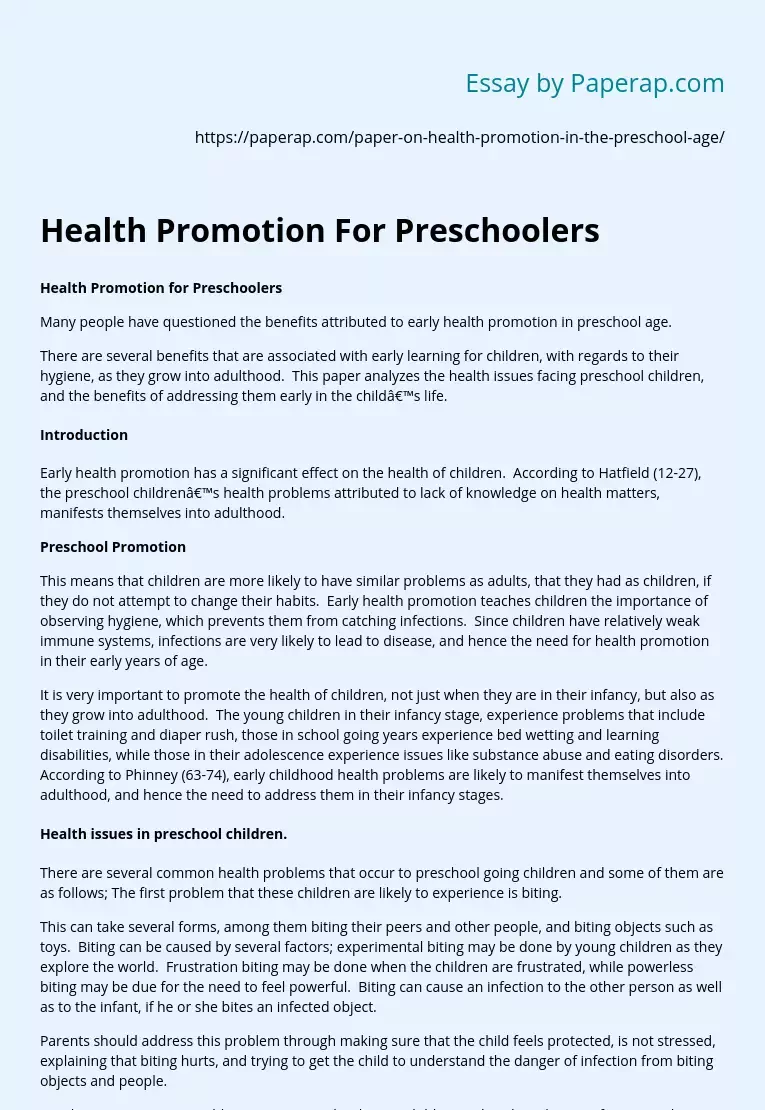Health Promotion for Preschoolers
Many people have questioned the benefits attributed to early health promotion in preschool age.
There are several benefits that are associated with early learning for children, with regards to their hygiene, as they grow into adulthood. This paper analyzes the health issues facing preschool children, and the benefits of addressing them early in the child’s life.
Introduction
Early health promotion has a significant effect on the health of children. According to Hatfield (12-27), the preschool children’s health problems attributed to lack of knowledge on health matters, manifests themselves into adulthood.
Preschool Promotion
This means that children are more likely to have similar problems as adults, that they had as children, if they do not attempt to change their habits. Early health promotion teaches children the importance of observing hygiene, which prevents them from catching infections. Since children have relatively weak immune systems, infections are very likely to lead to disease, and hence the need for health promotion in their early years of age.
It is very important to promote the health of children, not just when they are in their infancy, but also as they grow into adulthood. The young children in their infancy stage, experience problems that include toilet training and diaper rush, those in school going years experience bed wetting and learning disabilities, while those in their adolescence experience issues like substance abuse and eating disorders. According to Phinney (63-74), early childhood health problems are likely to manifest themselves into adulthood, and hence the need to address them in their infancy stages.
Health issues in preschool children.
There are several common health problems that occur to preschool going children and some of them are as follows; The first problem that these children are likely to experience is biting.
This can take several forms, among them biting their peers and other people, and biting objects such as toys. Biting can be caused by several factors; experimental biting may be done by young children as they explore the world. Frustration biting may be done when the children are frustrated, while powerless biting may be due for the need to feel powerful. Biting can cause an infection to the other person as well as to the infant, if he or she bites an infected object.
Parents should address this problem through making sure that the child feels protected, is not stressed, explaining that biting hurts, and trying to get the child to understand the danger of infection from biting objects and people.
Another very common problem among preschool going children is thumb sucking. In fact, according to Grombakh (77-89), 90% of children begin this habit when they are aged about two hours old. He further goes on to say that it is a normal habit that should not cause much worry to parents, provided that it is discontinued by the time the child reaches five years of age.
If thumb sucking continues beyond five years of age, there are problems that can result from the habit. Some of these problems include thumb calluses, protruding front teeth and sore thumbs. There is also the danger of catching an infection, especially if the hands are not clean.
The parents should try to discourage the child from thumb sucking through the use of pacifiers, which cause lesser damage to teeth, as well as due to their ability to be cleaned. However, the parents should also make sure that the child understands the dangers associated with thumb sucking for long periods of time.
The third health problem that is common to children, in their preschool going years, is stuttering. This is a speech disorder that may take several forms, such as poor pronunciation, pausing between words, leaving out sounds or words, and repeating phrases or words. This problem is made worse by parents who try to force their children, with this problem, to speak well.
This is because the child recognizes that he or she has a problem, and in struggling to improve their speech, actually makes it worse. According to Kimbrough and Henderson (33-51), speech problems are normal in the development of children, and occur in about 90% of them.
However, they further add that true stuttering is rare and occurs in just 1% of children, and is more common in boys than girls. Developmental stuttering is usually caused by language and speech development processes, and the child usually outgrows it. True stuttering is usually caused by brain disorders, and a child specialist will be able to diagnose and treat the disorder.
Parents can however help in the development of speech through making talking fun, and not interrupting the child as he or she speaks, regardless of whether they are making mistakes.
Health Promotion For Preschoolers. (2019, Dec 05). Retrieved from https://paperap.com/paper-on-health-promotion-in-the-preschool-age/

